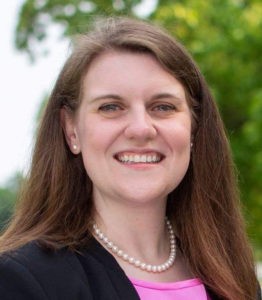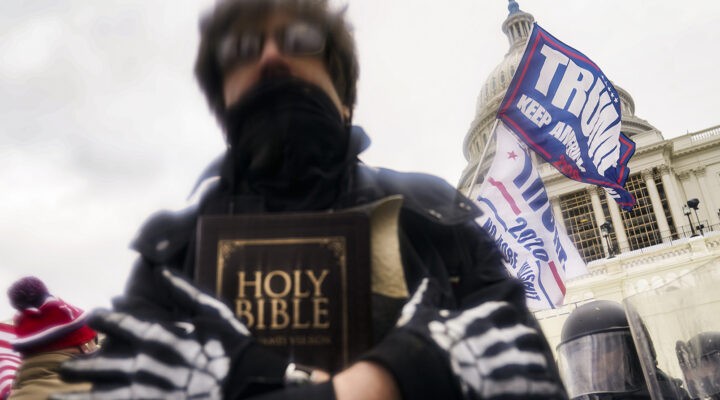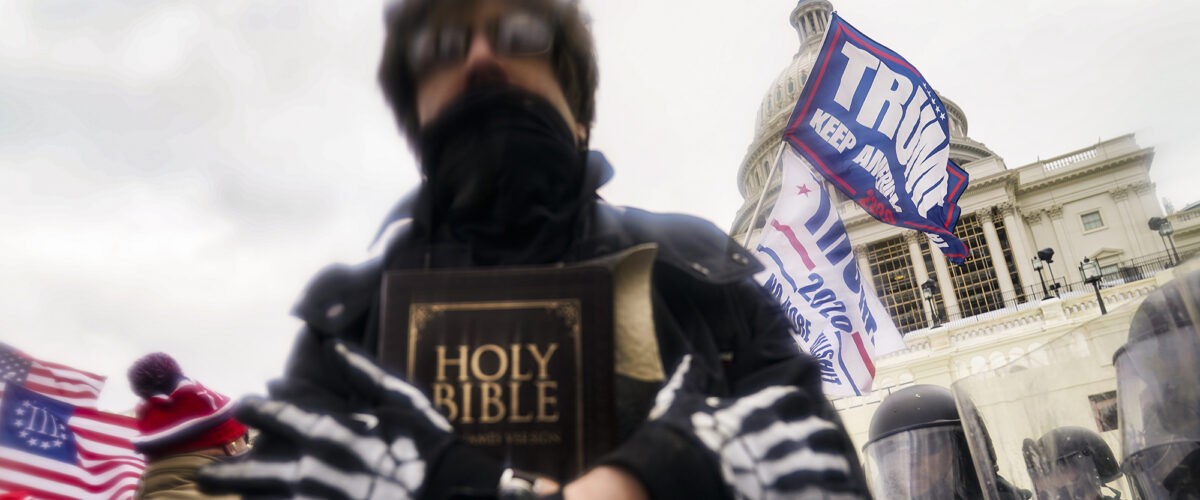Editor’s note: This is the second opinion piece in a new series on religious liberty authored by BJC Fellows and made possible by a grant from the Prichard Family Foundation.
“Stupidity is a more dangerous enemy of the good than malice,” Dietrich Bonhoeffer wrote in 1942 about his opposition to Nazism in Germany. “One may protest against evil; it can be exposed and, if need be, prevented by use of force. Evil always carries within itself the germ of its own subversion in that it leaves behind in human beings at least a sense of unease. Against stupidity we are defenseless.”
Bonhoeffer’s words for his co-conspirators have a strange ring to them today. The social and political chasm in the United States feels, at times, unable to be reconciled into something cohesive.

Claire Hein Blanton
It is as if we are arguing against stupidity at times — stupidity not in terms of ignorance but in terms of willful refusal to recognize the humanity in the other. This is not to say there are “good people on both sides,” as former President Donald Trump claimed after the Unite the Right rally in Charlottesville, Va.
While there are identity politics on both sides driving this depth of the chasm, I question how a “good person” could want to eradicate an entire race in the name of racial purity. We are in a moment in American history where that type of radicalization is ever increasing and needs to be addressed, lest the whole American experiment go up in both proverbial and physical flames.
What is most alarming, to me at least, is the alignment of far-right ideologies and evangelical Christian belief. Evangelicals wanting the government to usher in Christian nationalism, a political ideology and cultural framework that merges Christian and American identities, is dangerous. It is very dangerous. It comes not only from a place of Christian superiority but from a place of racial purity.
As Christians, we should be screaming from the rooftops about the danger of being knitted together with government authority. Therefore, it is so important that we have institutions working against that. The Christians Against Christian Nationalism campaign started by BJC is, in my view, one of their most important pieces of work in the past few years.
Robert P. Jones, author of White Too Long: The Legacy of White Supremacy in American Christianity, notes that 81% of self-identified evangelicals supported Trump in the 2016 presidential election, and roughly the same number voiced support in the 2020 midterms.
The unholy alliance between the far right and evangelicalism has been growing since the days of Jerry Falwell and the Moral Majority, so it may be unsurprising that as a group they have aligned themselves with the Republican Party. And by no means am I suggesting here the Republican Party is inherently evil or full of “stupid” people. Rather, I want to voice the concern that many evangelical Christians are falling prey to a type of theocratic rhetoric that could dismantle the right to religious freedom as guaranteed by the First Amendment.
The late Michael Gerson, a speechwriter for former President George W. Bush, wrote in The Atlantic about the “unholy alliance” between evangelicals and Trump. He began with the statement that “Trump’s background and beliefs could hardly be more incompatible with traditional Christian models of life and leadership.” And yet it appears that in promising to bring the country back to its Christian foundations, Trump swayed voters despite his personal behavior that would not align with the morality demanded by evangelical leaders of others.
“We may have been a country that was predominantly Christian, but we were never a Christian country.”
What, then, is wrong with wanting to return to a time when the bedrock of society was Christianity? For one, that is an erroneous belief. The founders may (or may not) have been Christian, but the documents that created this experiment we know as the United States were fully secular. The imprint of “In God We Trust” did not originate with those men, but Congress just declared it as our country’s motto in the 1950s. We may have been a country that was predominantly Christian, but we were never a Christian country.
In the founding era, Baptist preacher John Leland championed the First Amendment, in part because the Baptist church was a minority religion. Leland knew that to allow the government to dictate a particular religion could mean outlawing Baptist beliefs.
From the early days of this country’s founding, there have been no shortage of Baptists. Colonial-era Baptists today would likely seek to protect those within our borders from undue religious influence by the state, and they might also align themselves with evangelicals. And yet here we are today, electing people such as Rep. Marjorie Taylor Greene who said the Republican Party should be the party of “Christian nationalism.”
When we think of the stupidity Bonhoeffer wrote against, this may be its modern incarnation: A desire to push religious doctrine on everyone, claiming to uphold the First Amendment when what it really does is dismantle it.
“Government shouldn’t do the job of religion, and vice versa.”
At this point in history, BJC is trying to keep in place those protections the founders created. BJC is speaking out against infringements on civil rights and supporting the wall separating the institutions of church and state. This does not mean religion has to be completely removed from our civil discourse, but it means the government shouldn’t do the job of religion, and vice versa.
As a BJC Fellow, the most profound argument I heard during our training in Colonial Williamsburg was that I should imagine a different religious group was in political power. Would I want the dominant political group to force me to convert to their “approved” religion? What if they made my form of worship impossible?
This is the type of thinking that protects us from the stupidity of groupthink.
We are at a crossroads in our country. Will we allow Christian nationalism to dominate our politics and culture? Will we continue to allow “stupidity,” as Bonhoeffer defines it, to bring more and more people into a dangerous echo chamber that denies the value of those outside it? It is of grave importance to support organizations and people fighting for religious liberty for all. The people being sucked into these movements are not stupid, but they are feeling marginalized. There are better ways to combat that marginalization that do not involve denying others their civil rights.
Claire Hein Blanton holds a Ph.D. in systematic theology and ethics from the Department of Divinity, History and Philosophy at the University of Aberdeen. She was a member of the 2018 class of BJC Fellows.
BJC Fellows come from diverse educational, professional and religious backgrounds to learn in an intensive education program that equips them for advocacy to protect religious liberty. Learn more about the program here.
Related article:
‘Thou shalt not covet thy neighbor’s wife’ and other posters I do not want in a first grade classroom | Opinion by Britt Luby


